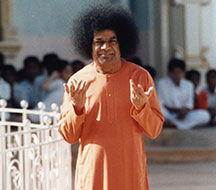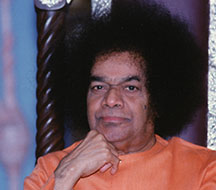
Give up ego; Bhakta Ramadas story
Puttaparthi, Sai Kulwanth Hall (Christmas )
Description
Never give scope for ego. Ramadas also said this. Ramadas faced difficulties, Thyagaraja faced problems. Difficulties are necessarily experienced by devotees. Why do these difficulties arise? To strengthen your faith. To purify your heart. In order to solve your problems, just as to clean a vessel, you have to struggle a lot. The human heart is full of dirt. The vessel of the human heart must be cleansed well. This is why you face difficulties. Ramadas, Tukaram and Thyagaraja conveyed this. Thyagaraja felt sad because he was separated from Rama, and wondered how he could live without Rama. He felt very angry with Rama. "Are You really powerful? Oh Rama! If you have any power, why don't you solve my problems? You are powerless, I have devotion." He praised his own devotion and became egoistic. "I have Bhakthi, devotion. You don't have Shakthi, power." He sat in meditation. "I'm very unlucky, I'm very bad. Do I know that I have devotion? Do I know that you have no power? It is a mistake." He sought pardon from God. "Rama! Who can know Your strength, Your power? (Without Your power), Can a monkey cross the ocean? Would it be possible to tie You to a mortar? Would Lakshmana worship (You if You were powerless)? Would Goddess Lakshmi wed You (if You were powerless)? Would the intelligent Bharatha serve you?" Rama's power is so mighty. "Your power, your strength is so mighty. Since I am low and mean, I took your power also to be mean - pardon me", he said. When once he sought pardon and surrendered, immediately both of them (Rama and Lakshmana) manifested there. The moment you put on the switch, the light appears right away - there will not be any delay, not even for a second. Therefore they manifested immediately. And then they went to Taanisha. "Here - we're repaying your money". "Who sent you?" "Ramadas sent us" "How could he get so much of money? Who are you?" They said "We are Rama and Laxmana, we are sent by Ramadasu." Rama and Laxmana have become servants of Ramadasu. God becomes a servant to His devotee. The devotee is not able to understand the strength of devotion. All the devotees should spend their life this way, propagate these ideals in society. There will be obstacles in the path of the devotion. There will be many arguments and accusations, they may make fun of you and you will be humiliated but you will never lose out in the end. If anyone harms you, they will ultimately face the reaction. Nothing comes in the way of God, God is always sacred.
Chinna Kathas
-Ego
-

Ego and attachment are hindrances to service
00:05:12Before undertaking this kind of selfless work, we should see that all attractions, likes and dislikes, the ego and any selfishness are removed from our mind before entering the society for the sake of work. Some attachments, likes and dislikes pursue the members for our sevadal even though they do not have selfishness or suffer from ego.These attachments and these likes are very dangerous. Whoever promotes the growth of a thorny bush, the bush will try to use the very thorns to prick and hurt the person who has grown it. The attachment is also like a thorny bush. There is one small example for this. In a certain village, in a home in a particular street, a father is grieving for his dead son. The neighbour comes to console in many ways this father, who is grieving the death of his son. While consoling the father the neighbour tells him that the body is made up of material stuff and is bound to perish, it’s the soul that is deathless and many more such things from Vedanthic truths. After some time, the son of the neighbour who had been sermonizing Vedanta, passed away. The father who was in grief in the beginning goes to the neighbour's home and consoles him exactly in the same terms, using the same Vedantic truths!! When the son of the first individual died, the second individual had no grief what so ever as it was not his son who died! When the son of the second individual died, the first individual had no grief what so ever for the same reason. What is the reason? The individual whose son has died grieves because he thinks “He is my son.” In the second case why does the sorrow disappear? It’s because he has no connection what so ever or any attachment to the person who has died. It's perfectly clear here that sorrow comes because of attachment and liking, it does not come by any other process.
